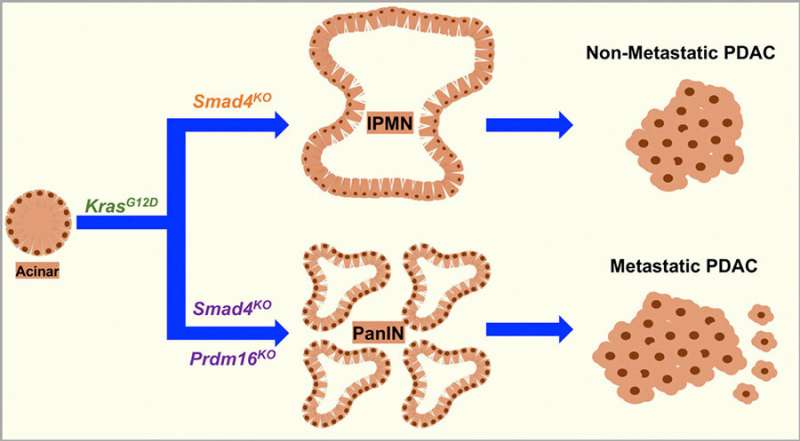This article has been reviewed according to Science X's editorial process and policies. Editors have highlighted the following attributes while ensuring the content's credibility:
fact-checked
peer-reviewed publication
trusted source
proofread
Protein partnership effectively fends off pancreatic cancer progression

Scientists at VCU Massey Cancer Center have uncovered a previously unrecognized relationship between two sets of proteins that operate in tandem to fend off the growth of pancreatic cancer. The findings could provide pivotal information for the development of novel therapies for what is currently an incurable disease.
Pancreatic ductal adenocarcinoma (PDAC) accounts for the vast majority of all pancreatic tumors and is the fourth-leading cause of cancer-related deaths worldwide. Most patients are diagnosed at an advanced stage when the disease is already inoperable and there are no effective therapies.
New research published in the Journal of Cell Biology, led by Azeddine Atfi, Ph.D., leader of the Cancer Biology research program who holds the Mary Anderson Harrison Distinguished Professorship in Cancer Research at Massey, discovered that the simultaneous activation of two gene-regulating proteins—Prdm16 and Smad4—is associated with a cutback in pancreatic cancer progression.
"Our study sheds light on a previously uncharacterized interplay between Smad4 and Prdm16, which appears to dictate the growth trajectory of pancreatic cancer, that could ultimately pave the way for innovative therapeutic breakthroughs to curb this deadly disease," said Atfi, who is also a professor in the Department of Biochemistry and Molecular Biology at the VCU School of Medicine.
The absence of Smad4 has previously been connected to cancer growth in PDAC cells. Prdm16 controls a variety of essential cellular processes, including the construction of tissues and organs. The protein was first observed scientifically in leukemia, where previous research indicated that it might function as a tumor suppressor, but had not been studied in pancreatic cancer.
Atfi and his research team discovered that when both Prdm16 and Smad4 were inactivated, the pancreatic tumors grew aggressively and formed metastatic lesions in the lung. However, they also determined that when Smad4 was inactivated alone, Prdm16 became overexpressed and contributed to cancer growth.
When the research team observed cells with both proteins activated—where Prdm16 was located downstream along the same genetic messaging pathway as Smad4—Prdm16 successfully suppressed tumor progression and metastasis in pancreatic cancer cells, suggesting they both play an important, combined role in fighting off cancer cells.
"Think of Smad4 as a movie director telling Prdm16 how to fulfill the role of a cancer fighter. Without Smad4 as the director, Prdm16 starts to play the part of a cancer supporter," Atfi said. "Our findings point to a previously unidentified mechanism that orchestrates the antitumor role of Prdm16, and further shed new insights into the molecular cause of pancreatic cancer."
More research must be conducted to firmly establish whether Prdm16 elicits anti-tumor activity at early stages, and if this occurs through directs effects on cancer cell growth or through reprogramming of the tumor microenvironment. Atfi said a more comprehensive investigation of how Smad4 and Prdm16 interact could help identify additional genetic players that could be targeted through cancer treatment.
"We anticipate that our discovery will guide forthcoming studies seeking to understand and unravel the cellular paradigms of pancreatic cancer," Atfi said.
More information: Eric Hurwitz et al, Antagonism between Prdm16 and Smad4 specifies the trajectory and progression of pancreatic cancer, Journal of Cell Biology (2023). DOI: 10.1083/jcb.202203036

















